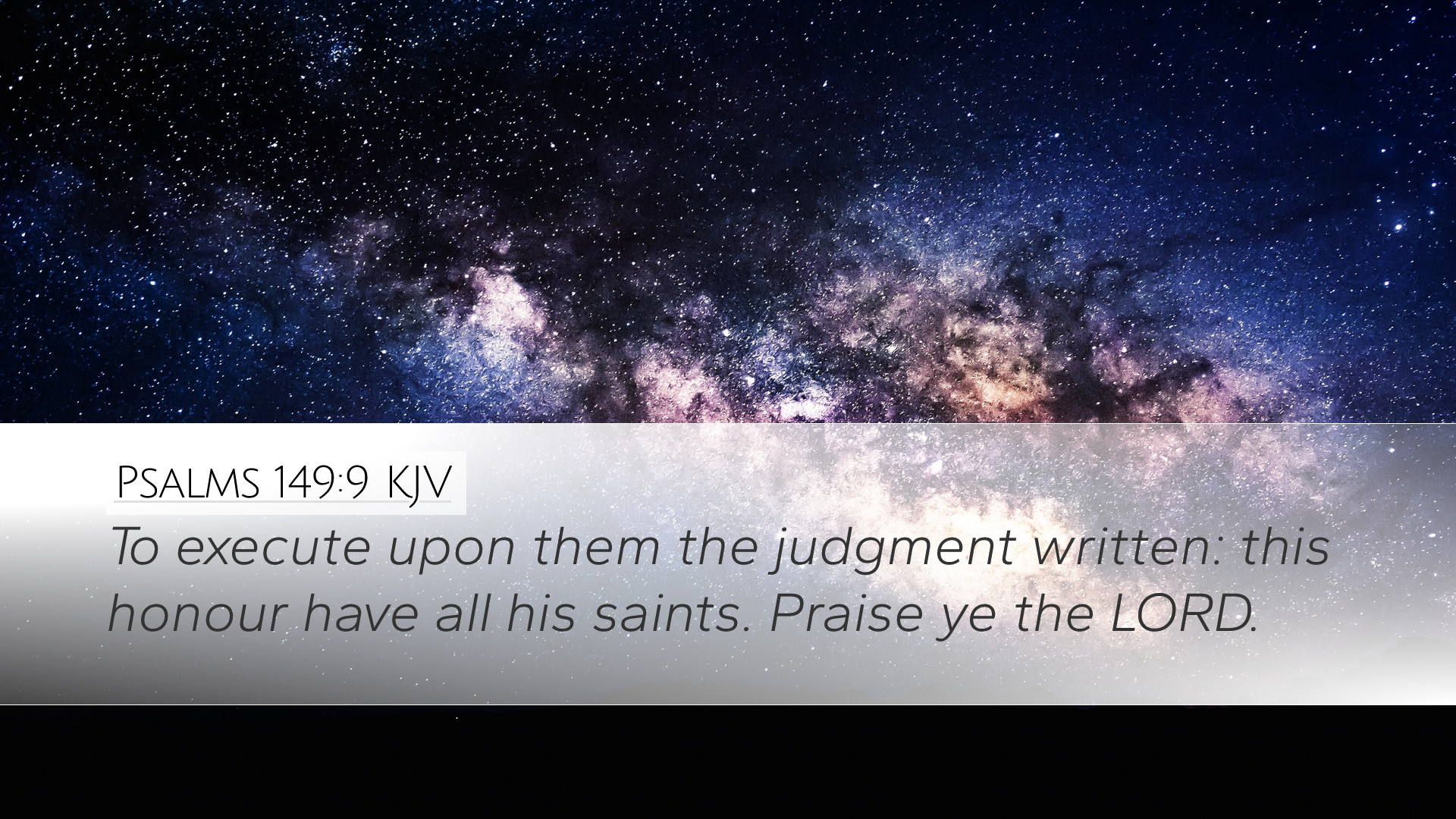Commentary on Psalms 149:9
Verse Context: Psalms 149:9 states: "To execute upon them the judgment written: this honour have all his saints. Praise ye the Lord.” This verse encapsulates a dual theme of judgment and praise, set within the broader context of the Book of Psalms, which often intertwines worship with expression of divine justice.
Exegesis and Interpretation
This verse reflects not only the confidence of the Israelites in the just reign of God but also identifies the active role of the saints in executing divine judgment. The psalmist invites the faithful to engage in the process of judgment, which serves as a powerful reminder of God’s sovereignty over nations and individuals alike.
Judgment and Authority
Matthew Henry remarks on the "judgment written," referring to the decrees of God that are unalterable and just. This indicates that God's plans for justice are already established in His laws and decrees, revealing the certainty of divine retribution against the enemies of God.
Albert Barnes adds that this passage signifies the authority bestowed upon the saints, which suggests their involvement in declaring God’s judgment upon the wicked. This is not merely punitive; it is an act that vindicates God's holiness and righteousness.
Role of the Saints
Both Henry and Clarke emphasize the honor granted to the saints—that they are not passive recipients of God’s justice but active participants in His divine plan. The reference to “all his saints” serves to elevate the collective identity of believers, illustrating the unity and strength derived from divine approval and purpose.
This participation is understood as both a privilege and a responsibility; it is an invitation into an active, faithful life that aligns with God’s mission of justice on earth.
Insights on Praise
The latter part of the verse, "Praise ye the Lord," speaks to the heart of worship and the natural response to understanding divine authority. Adam Clarke expounds on the relationship between judgment and praise, suggesting that the acknowledgment of God’s righteous judgment fosters an atmosphere of worship among the saints. When one recognizes God’s justice, one cannot help but respond with praise.
Praise is thus interwoven with the execution of divine justice; it is a declaration of trust in God’s ultimate sovereignty, encouraging believers to express their adoration and commitment to God in their actions and lives.
Theological Implications
This verse offers profound theological implications regarding the character of God—as both a just ruler and a loving protector of His people. The synthesis of judgment and praise presents a holistic view of God's nature, where His righteousness leads to the establishment of justice, and that justice evokes worship.
- Divine Justice: The psalm underscores that God’s justice will prevail, instilling hope in His people.
- Active Participation: The saints are called to engage actively with God’s will, emphasizing their role in the unfolding of His plan.
- Worship and Justice: True worship acknowledges God’s right to judge and brings about a heartfelt response of praise.
Conclusion
Psalms 149:9 serves as a profound reminder to both leaders and laypeople of their place within God’s redemptive narrative. Drawing from rich theological insights, we are invited not only to worship but to actively participate in the realization of God’s justice on earth. As we embrace this dual role of judgment and praise, we align ourselves with God's purposes, fulfilling the honor bestowed upon us as His saints.
In conclusion, the contemplation of Psalms 149:9 encourages believers to recognize the gravity of their calling, to uphold justice, and to lead lives that are responses of worship to the Almighty God, whose judgment is both an affirmation of His righteousness and a call to action for all His devoted followers.


